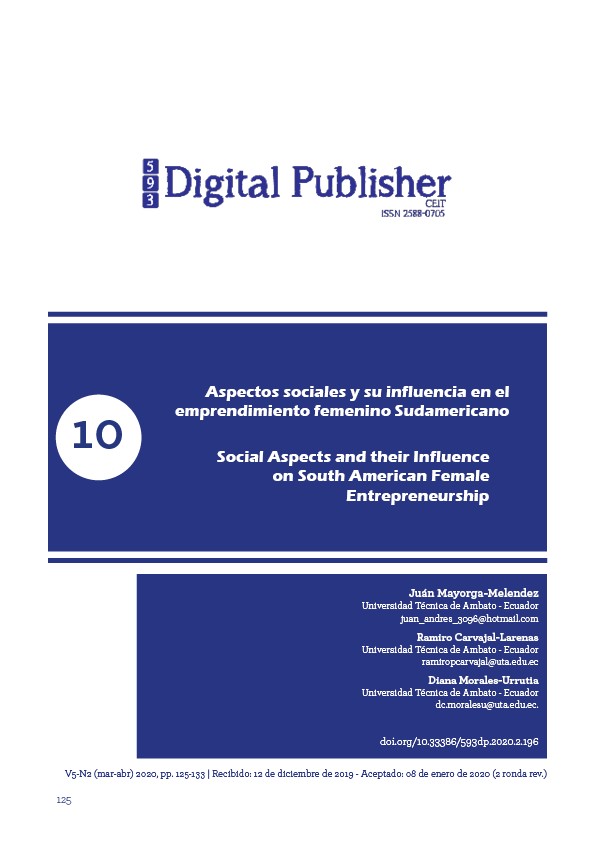Social Aspects and their Influence on South American Female Entrepreneurship
Main Article Content
Abstract
The study of female entrepreneurship has aroused economic and political interest, as well as academic and scientific attention, therefore, it is important to contribute to the generation of knowledge of this subject that is still in an incipient state. This research analyzes the social factors that influence female entrepreneurial activity in South America. It is based on a review of specially specialized literature, an empirical level that applies principal component analysis (ACP) with data from the Global Entrepreneurship Monitor (GEM) for the period 2008-2013. The results show that the factors related to social and cultural aspects such as: creating an enterprise is a professionally socially accepted option for women, promoting self-employment or the creation of businesses among women and both men and women have equal access opportunities to create a company, they maintain a high degree of significance with female entrepreneurship in the analyzed countries. One aspect to conclude is related to some reflection notes and challenges that address aspects that are not being contemplated in the societies of the South American region.
Downloads
Article Details
1. Derechos de autor
Las obras que se publican en 593 Digital Publisher CEIT están sujetas a los siguientes términos:
1.1. 593 Digital Publisher CEIT, conserva los derechos patrimoniales (copyright) de las obras publicadas, favorece y permite la reutilización de las mismas bajo la licencia Licencia Creative Commons 4.0 de Reconocimiento-NoComercial-CompartirIgual 4.0, por lo cual se pueden copiar, usar, difundir, transmitir y exponer públicamente, siempre que:
1.1.a. Se cite la autoría y fuente original de su publicación (revista, editorial, URL).
1.1.b. No se usen para fines comerciales u onerosos.
1.1.c. Se mencione la existencia y especificaciones de esta licencia de uso.
References
CEPAL. (2017). CEPAL: Pese a avances recientes, América Latina sigue siendo la región más desigual del mundo. Recuperado de https://www.cepal.org/es/comunicados/cepal-pese-avances-recientes-america-latina-sigue-siendo-la-region-mas-desigual-mundo
Davidsson, P., Low, M. B., & Wright, M. (2001). Editor’s Introduction: Low and MacMillan Ten Years On: Achievements and Future Directions for Entrepreneurship Research. Entrepreneurship Theory and Practice, 25(4), 5–15. https://doi.org/10.1177/104225870102500401
de la Fuente, S. (2011). Análisis de Componentes Principales. Universidad Autónoma de Madrid, 34.
Elizundia, M. E. (2015). Desempeño de nuevos negocios: Perspectiva de género. Contaduría y Administración, 60(2), 468–485. https://doi.org/10.1016/S0186-1042(15)30010-3
Heller, L. (2010). Mujeres emprendedoras en América Latina y el Caribe: Realidades, obstáculos y desafíos. Santiago de Chile: Naciones Unidas, CEPAL, Div. de Asuntos de Género.
Ilie, C., Cardoza, G., Fernández, A., & Tejada, H. (2018, febrero). Entrepreneurship and Gender in Latin America. Recuperado de https://ssrn.com/abstract=3126888 or http://dx.doi.org/10.2139/ssrn.3126888
Jalbert, S. E. (2000). Women Entrepreneurs in the Global Economy. Recuperado de https://numerons.files.wordpress.com/2012/04/17women-entrepreneurs-in-the-global-economy.pdf
Justo, R., & DeTienne, D. (2008). Gender, family y situation and the exit event: Reassesing the opportunity-cost of business ownership. IE Business School Working Paper. Recuperado de https://www.researchgate.net/profile/Rachida_Justo/publication/23528730_Gender_family_situation_and_the_exit_event_reassessing_the_opportunity-costs_of_business_ownership/links/0c96052527a4ac9364000000/Gender-family-situation-and-the-exit-event-reassessing-the-opportunity-costs-of-business-ownership.pdf?origin=publication_detail
Maloney, W. F. (2004). Informality Revisited. World Development, 32(7), 1159–1178. https://doi.org/10.1016/j.worlddev.2004.01.008
Minniti, M., & Naudé, W. (2010). What do we know about the Patterns and Determinants of Female Entrepreneurship Across Countries? The European Journal of Development Research, 22(3), 277–293. https://doi.org/10.1057/ejdr.2010.17
Murrone, N., & Martínez, A. (2018). Comparación de propuestas para el análisis de componentes principales en matrices con datos faltantes. 1, 76. Palermo: Universidad de Palermo.
Nichter, S., & Goldmark, L. (2009). Small Firm Growth in Developing Countries. World Development, 37(9), 1453–1464. https://doi.org/10.1016/j.worlddev.2009.01.013
Ortiz, P. (2017). El discurso sobre el emprendimiento de la mujer desde una perspectiva de género. Vivat Academia, 0(140), 115. https://doi.org/10.15178/va.2017.140.115-129
Palma, M. (2017). Emprendimiento y responsabilidad social: Análisis estadístico de la participación de la mujer en Ecuador. 1, 275–285. Machala: Universidad Técnica de Machala.
Powers, J., & Magnoni, B. (2010). Dueña de tu propia empresa: Identificación, análisis y superación de las limitaciones a las pequeñas empresas de las mujeres en América Latina y el Caribe. Washington, D.C.: Fondo Multilateral de Inversiones, BID.
Radović Marković, M. (2013). Female Entrepreneurship: Theoretical Approaches. Journal of Women’s Entrepreneurship and Education, 1–2, 1–9.
Saavedra, M. L., & Camarena, M. E. (2015). Retos para el emprendimiento femenino en América Latina. Criterio Libre, 13(22), 24.
SELA. (2010). Desarrollando mujeres empresarias: La Necesidad de Replantear Políticas y Programas de Género en el Desarrollo de PYMES. Caracas, Venezuela: Secretaría Permanente del SELA.
Swinney, J. L., Runyan, R. C., & Huddleston, P. (2006). DIFFERENCES IN REPORTED FIRM PERFORMANCE BY GENDER: DOES INDUSTRY MATTER? Journal of Developmental Entrepreneurship, 11(02), 99–115. https://doi.org/10.1142/S1084946706000350
Teignier, M., & Cuberes, D. (2014). Aggregate Costs of Gender Gaps in the Labor Market: A Quantitative Estimate. SSRN Electronic Journal. https://doi.org/10.2139/ssrn.2405006
Weeks, J. R., & Seiler, D. (2001). Women’s Entrepreneurship in Latin America: An Exploration of Current Knowledge 11. Recuperado de https://publications.iadb.org/en/publication/11526/womens-entrepreneurship-latin-america-exploration-current-knowledge

